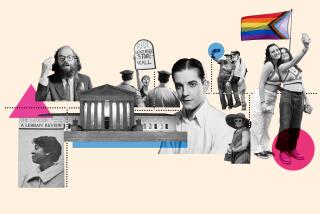Clinton Speaks the Hatersâ Code Word : Gay Rights: By calling homosexuality a âlifestyle,â he accedes to the view that itâs a choice to make--and unmake.
President Clintonâs answer to a ministerâs recent question about gays and lesbians in the military was generally and correctly taken as a signal of retreat from his original, stated intention to issue an executive order banning discrimination against homosexuals soldiers. The President said that âmost Americans believe that the gay lifestyle should not be promoted by the military or anybody else in this country.â And, he added, he seeks a compromise that âdoes not appear to endorse a gay lifestyle.â
This phrase, gay lifestyle, has become the key code word of anti-gay activists. For this President to have employed it, especially in a public answer to a question about homosexuals in the military, signals more than a move away from another one of his public positions. It is a changing of sides on a significant civil-rights issue.
Central to the anti-gay position is the notion that sexual orientation is not an immutable characteristic requiring equal protection of the laws, but a matter of choice. It is easier to persist in anti-homosexual prejudice if you believe that homosexuality is like adultery, something you choose to do, rather than like heterosexuality, something you are.
Scientists have only begun to investigate this subject, although recent studies of brain chemistry and of the incidence of lesbian and gay twins suggest that sexual orientation is genetically inherent. Few reputable scientists credit the notion that homosexuals can choose their sexual orientation. Even if sexual orientation results from what some social scientists call âcultural formation,â it still presents itself to most lesbian and gay people as a fact rather than a choice.
Talking about a gay âlifestyleâ is a rhetorical device by which anti-gay activists can associate the ordinary lives gay and lesbian Americans lead with habits and practices that they know will incite other ordinary Americans against us. What homosexual Americans do choose to do, in ever-increasing numbers, is to âcome outâ and press their claim for equal protection of the laws. This is the real choice that has stirred up controversy.
Early in his election campaign, President Clinton told gay and lesbian groups that they were a part of his encompassing vision and promised executive action to reverse prejudice. Michael Dukakis in 1988 refused organized gay money because he knew that if elected he could not make good on any promises he might make to the community. Clinton asked for and got our support because, he said, he believed in our civil rights. And now he is telling the people for whom the promise of gay rights is a threat to their religiously established moral order that nobody is going to promote the âgay lifestyle.â
Maybe one of the various compromises under discussion will end the anti-gay witch hunting in the military. Maybe not. But one thing is certain: With or without the President, homosexual Americans are embarked on a civil-rights movement.
Civil rights movements have historically been necessary because the prejudice that sustains discrimination is widespread and serves powerful interests. Partly for that reason, presidents have generally been followers, not leaders, in civil rights. Even so, the words that President Clinton chose are ominous for Americans who recognize that what is as stake here is not lifestyle but life, as in life, liberty and the pursuit of happiness.
More to Read
Sign up for Essential California
The most important California stories and recommendations in your inbox every morning.
You may occasionally receive promotional content from the Los Angeles Times.









